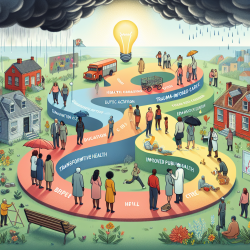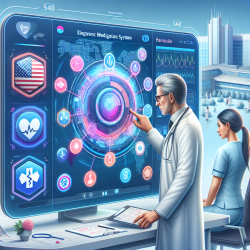Unlocking the Secrets of Phytoplankton Competition: A New Frontier for Online Therapy Practitioners
In the world of special education and online therapy, understanding the dynamics of competition and cooperation is crucial. A recent study titled "The paradox of enrichment in phytoplankton by induced competitive interactions" sheds light on the complex interplay of competition among phytoplankton species, providing insights that can be adapted to improve therapeutic practices.
The Paradox of Enrichment: What It Means
The paradox of enrichment is a concept that explains how increasing nutrient levels in an ecosystem can lead to a decrease in species diversity. This phenomenon is particularly evident in aquatic ecosystems, where nutrient enrichment, often due to human activities, results in the dominance of a single phytoplankton species at the expense of others.
The study utilizes a lattice Lotka-Volterra competition model to simulate the competition for space and nutrients among phytoplankton species. The findings reveal that under local interactions, where species reproduce in adjacent vacant sites, competition is less intense, allowing for greater diversity. However, as nutrient levels rise, competition intensifies, leading to the dominance of a single species.
Implications for Online Therapy Practitioners
While the study focuses on phytoplankton, the principles of competition and cooperation can be applied to therapeutic practices. Here are some key takeaways for practitioners:
- Understanding Competition: Recognize that competition can be both beneficial and detrimental. In therapy, fostering a healthy level of competition can motivate students, but excessive competition may hinder collaboration and learning.
- Promoting Diversity: Just as diverse ecosystems are more resilient, diverse therapeutic approaches can cater to a wide range of student needs. Encourage a variety of learning methods and activities to support different learning styles.
- Balancing Resources: Ensure that resources (time, attention, materials) are distributed equitably among students to prevent any one student from dominating the learning environment.
Encouraging Further Research
The study highlights the importance of understanding competitive interactions in ecosystems. For practitioners, this underscores the need for ongoing research and adaptation of new strategies to improve therapeutic outcomes. Consider attending conferences, participating in webinars, and networking with peers to stay informed about the latest research and developments in the field.
Conclusion
The paradox of enrichment in phytoplankton provides valuable insights into the dynamics of competition and cooperation. By applying these principles, online therapy practitioners can enhance their practices, fostering a more inclusive and effective learning environment for students.
To read the original research paper, please follow this link: The paradox of enrichment in phytoplankton by induced competitive interactions.










